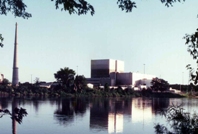The Minnesota Senate has voted to lift a moratorium on the construction of new nuclear plants in the state. A bill seeking to lift a similar ban in the state of Kentucky is making its way to that state's Senate.
 |
| Monticello: one of three Minnesotan reactors |
Marshall Cohen, senior director for state and local government affairs at the US Nuclear Energy Institute (NEI), welcomed the news. "Today's action in the Minnesota Senate represents an important political consensus of the merits of broadening the clean energy options for Minnesotans going forward. Repealing a moratorium in Minnesota or elsewhere does not represent a commitment to building new nuclear energy facilities. But it is an important recognition that a broad portfolio of clean generating technologies is in any state’s best interests," he said in a statement. He went on to praise the efforts of Minnesota Senate majority leader Amy Koch for her "leadership in securing overwhelming bipartisan support" for the bill.
Minnesota's three operating nuclear reactors - Monticello and Prairie Island 1 and 2 - between them produced 23.5% of the state's electricity in 2009.
Kentucky committee favourable
Meanwhile, a bill introduced by Senator Bob Leeper has been passed by the Kentucky state Senate's Natural Resources and Energy committee. Senate Bill 34 calls for the repeal of the state's prohibition of the construction of new nuclear power plants until such time as the federal government would determine how to safely dispose of high-level radioactive waste. The moratorium has been in place since 1984.
The committee has "reported favourably" on the bill, introduced on 4 January, clearing the way for it to go before the state Senate. Like the Minnesota bill, it would need to be passed by both House and Senate before becoming law.
Kentucky does not currently have any operating nuclear power plants, although it is home to USEC's Paducah uranium enrichment plant.
Researched and written
by World Nuclear News






_15863.jpg)







